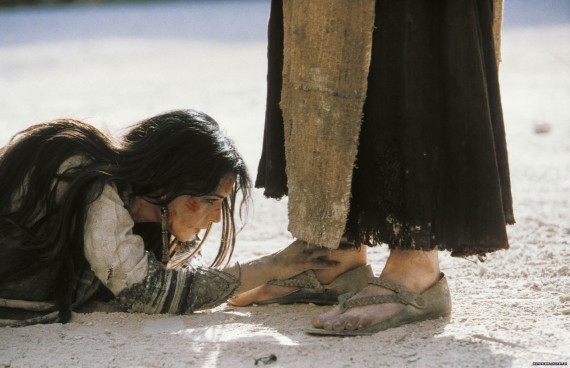 A reader recently sent in a question about whether or not she could lose her salvation. I searched my blog high and low for somewhere that I had answered this before, and much to my shock, could not find that I had previously written about this anywhere. I am certain I have written about it, but since I couldn’t find it, decided to write about it anyway. Here is the question she sent in:
A reader recently sent in a question about whether or not she could lose her salvation. I searched my blog high and low for somewhere that I had answered this before, and much to my shock, could not find that I had previously written about this anywhere. I am certain I have written about it, but since I couldn’t find it, decided to write about it anyway. Here is the question she sent in:
I m getting real confused on the subject of salvation as I am doing my bible study. I would be grateful if you could take out some time and clear my confusion.
Can a born again christian lose salvation? If yes, does that mean we can preserve our salvation by following some rules and doing good works? I personally dont believe in salvation by works but what confuses me is if we can lose salvation than we can protect it too which means we remain saved by works.
But if we can’t lose salvation, then what happens if we keep on enjoying worldly pleasures like fornication, orgies, adultery, drunkenness etc? The bible tells us that “such will not inherit the kingdom of heaven.”
This is a great question which millions of Christians around the world ask all the time. Can a Christian lose salvation?
Confusion about Losing Salvation
The reason there is so much confusion surrounding the question about whether or not Christians can lose salvation is mostly because of the word “salvation” itself.
As long as we think that the word “salvation” refers to forgiveness of sin, eternal life, escaping hell, and going to heaven when we die, we will always be confused about whether or not Christians can lose salvation.
Why? Because there are numerous texts in the Bible which talk about “saving” the soul from death, “saving” the life, being “saved” by works, faith alone doesn’t “save,” and so on throughout the Bible. If we read these passages thinking they are talking about how to receive eternal life, we will get very confused.
This is why I wrote an article a while back about the word “saved” in the Bible. Before you read further, you should go read that post, because I am not going to restate here what I wrote there. The bottom line idea, however, is that the “salvation” word family rarely refers to receiving eternal life. When the Bible wants to talk about eternal life, it uses terms like “eternal life” or “everlasting life.”
It would be wise for us to do the same …
Confusion about the Kingdom of God/Heaven
The second area of confusion that causes people to think they can lose their “salvation” is when they equate the Kingdom of God or Kingdom of Heaven with “heaven” or with eternal life. Just as with “salvation,” the Kingdom of God/Heaven are not the same thing as eternal life. The Kingdom of God/Heaven refers to the rule and reign of God in our lives. As we learn to follow Jesus, His rule and reign expands in our lives, and we exhibit the values and goals of His kingdom through our words and actions.
The same goes for inheriting the Kingdom, or even “inheriting” eternal life. Inheriting is different than receiving. Inheritance is something given to those who are “in the family” and so the only way to receive God’s inheritance is if you are already in God’s family, which happens by faith alone in Jesus Christ. Again, I have written about this here: The role of faith and works.
So Can a Christian Lose Salvation?
 Well, if you are asking, “Can a Christian lose eternal life?” the answer is no. If everlasting life can be lost, it has the wrong name. Besides, Jesus promises everlasting life to all who simply and only believe in Him for it (John 3:16; 5:24; 6:47), and if we believe that everlasting life is not everlasting, then we are doubting the words and promises of Jesus.
Well, if you are asking, “Can a Christian lose eternal life?” the answer is no. If everlasting life can be lost, it has the wrong name. Besides, Jesus promises everlasting life to all who simply and only believe in Him for it (John 3:16; 5:24; 6:47), and if we believe that everlasting life is not everlasting, then we are doubting the words and promises of Jesus.
But if a Christian cannot lose eternal life, then why should we not just go sin all we want? Because although we cannot lose eternal life, there is much to lose by sinning!
For example, we can lose our experience of the rule and reign of God in our lives (that is, lose our experience of the Kingdom of God). We can lose our fellowship with God (1 John). Since sin is so destructive, we can lose our health, wealth, and emotional well-being. We can lose our spouses, our children, and our jobs. We can lose contentment, joy, and satisfaction in life. We can lose peace.
So while there are all sorts of things a Christian can lose by sinning, eternal life is not one of them.
Here is another post which might help as well: Once Saved, Always Saved?
By the way, if you want to read more on this topic, I strongly recommend these books:
- Eternal Security by Charles Stanley
- Secure and Sure by Robert Wilkin
- Final Destiny by Joseph Dillow


 The basic idea behind soul sleep is that when a person dies, they do not immediately go to heaven to be with God, but enter into a state of unconscious limbo. They are no longer alive, but they are not in heaven either. They are not conscious of being dead, but they have not ceased to exist. Instead, they are “asleep.”
The basic idea behind soul sleep is that when a person dies, they do not immediately go to heaven to be with God, but enter into a state of unconscious limbo. They are no longer alive, but they are not in heaven either. They are not conscious of being dead, but they have not ceased to exist. Instead, they are “asleep.” 
 A reader recently sent in this astute question:
A reader recently sent in this astute question: The religious leaders are about to stone her to death when Jesus shows up, scribbles in the sand, and when no one is left to condemn her, tells her to “Go and sin no more.”
The religious leaders are about to stone her to death when Jesus shows up, scribbles in the sand, and when no one is left to condemn her, tells her to “Go and sin no more.” Basically, Jesus is saying, “My beautiful lady, I am sorry you got caught up in this. They were after me; not you. They framed you to get at me. I want to protect you from them, so please, consider leaving your current profession. They are likely going to seek to frame you again, and the next time, they won’t bring you to me. They’ll just kill you. Neither one of us want that, so go … do something different with your life.”
Basically, Jesus is saying, “My beautiful lady, I am sorry you got caught up in this. They were after me; not you. They framed you to get at me. I want to protect you from them, so please, consider leaving your current profession. They are likely going to seek to frame you again, and the next time, they won’t bring you to me. They’ll just kill you. Neither one of us want that, so go … do something different with your life.”




 It is also helpful to understand that probably about 95% (or more) of the Bible is primarily concerned with the right-hand column of the chart above. When you read in the Bible about proclaiming Jesus as Lord, following Jesus, taking up your cross, eternal reward, inheriting the Kingdom, life in the Spirit, faithful living, and on and on and on, the author who wrote that text was primarily thinking of how we should live as followers of Jesus so that we can experience the life God meant for us to live.
It is also helpful to understand that probably about 95% (or more) of the Bible is primarily concerned with the right-hand column of the chart above. When you read in the Bible about proclaiming Jesus as Lord, following Jesus, taking up your cross, eternal reward, inheriting the Kingdom, life in the Spirit, faithful living, and on and on and on, the author who wrote that text was primarily thinking of how we should live as followers of Jesus so that we can experience the life God meant for us to live. So, for example, if your hear a pastor saying, “You have to take up your cross daily and follow Jesus in order to go to heaven when you die,” you can look in the text he is preaching from (maybe Matthew 16:24-26 or Luke 9:23-26), and see that Jesus is talking about
So, for example, if your hear a pastor saying, “You have to take up your cross daily and follow Jesus in order to go to heaven when you die,” you can look in the text he is preaching from (maybe Matthew 16:24-26 or Luke 9:23-26), and see that Jesus is talking about 